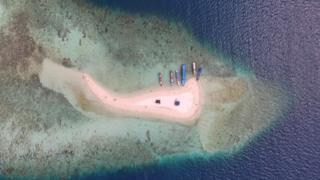 Image copyright
Image copyright
Aulia/UNDP Indonesia
Having more islands recognised would extend Indonesia’s sovereignty over the surrounding waters
Indonesia has so many islands it has never been able to fully count or name them.
A 1996 law estimated the number of islands in the world’s biggest archipelago at 17,508.
But the government is now hoping to get a definite number in time for a United Nations meeting in August.
They hope registering them all with the UN will help protect Indonesia’s vast territory and its rich fishing resources.
Under the UN Convention on the Law of the Sea (Unclos), an island is defined as a naturally formed area of land, surrounded by water, which is still exposed at high tide.
The name of an island can be officially recognised if it is known by at least two local people.
Image copyright
Asri/UNDP Indonesia
Bungin Belle is seasonally inhabited by some 25 families
Indonesia covers 1.9 million sq km (741,052 sq mi) so counting all the islands that fit the UN criteria is no small task.
Off the coast of Jakarta, for example, there are the stunning Thousand Islands – where the capital’s residents go on weekends. But no-one really knows exactly how many islands are even in that area.
The number of total islands in Indonesia listed under the 1996 law was just an estimate, and not verified by the UN criteria.
But at the last UN Conference on the Standardisation of Geographical Names in 2012, the Indonesian government registered 13,466 islands that it had located and named.
Image copyright
UNDP Indonesia
Many of the small atolls surrounded by coral reefs
The counting team from the Ministry of Marine Affairs and Fisheries told the BBC’s Indonesian service they wanted to add at least 1,700 new islands at the next meeting in August.
“That’s our list at the moment but the number will probably go up because we are in the process of validating and verifying islands right now and we will keep doing this till the end of July,” said Balok Budiyanto, a ministry official leading the team.
“We have to visit every one of these islands, and then we note the coordinates, the name, the meaning of the name, the history of the land and describe the landscape and its geographical history. We document all that in great detail and bring it back to the central team,” he explained.
Protecting national identity
The move to count the islands and registering their names is aimed at protecting territory and resources.
If outlying islands are recognised by the UN, it could help Indonesia claim sovereignty over the surrounding waters – which are disputed by neighbouring countries.
The government says illegal fishing in what it considers its waters is costing the country billions of dollars in lost revenue each year.
As a warning, they have been blowing up foreign boats found in their waters.
Image copyright
Aulia/UNDP Indonesia
Indonesia has everything from jungle-covered volcano islands to tiny palm tree-covered, coral-fringed atolls
Susan Herawati from the Coalition of People for Justice for Fisheries (Kiara) told the BBC that “60% of islands in Indonesia don’t have a name or officially have legal status, so they can easily be taken or claimed by another country”.
But it’s not just territorial disputes with other countries – listing the islands with the UN will also mean they won’t be “so vulnerable to being taken over by a private company”, she says.
As an example, Ms Herawati cites an island near the Gili islands off Lombok, a popular tourist spot, where one small island has been taken over by a private resort.
Indonesia is the world’s biggest archipelago
“There were 109 families who were kicked out of the area because it was being developed for tourists,” she explains, adding that the families were made to leave without receiving any compensation.
“This is about our identity as a nation. By clearly listing our islands then our fisherman have legal protection and rights over the islands and our ancestral seas,” she explains.
In 2002, Indonesia lost two islands to Malaysia – after the International Court of Justice ruled against it in a territorial dispute – and two to East Timor when it became independent.
Environmentalists have warned that Indonesia could lose thousands of islands if sea levels continued to rise due to climate change.
But keeping track of the islands could be an endless task, as Mr Balok says the counting group continues to find new islands “created due to earthquakes and volcanic eruptions”.
Reporting by BBC Indonesian’s Rafki Hidayat
Indonesia counts its islands to protect territory and resources}

